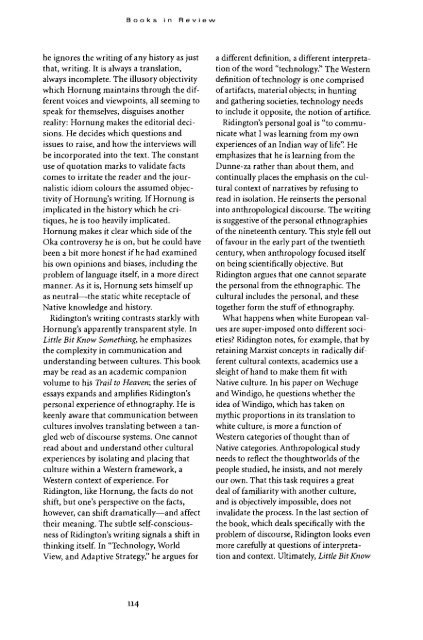To All Appearances A Lady - University of British Columbia
To All Appearances A Lady - University of British Columbia
To All Appearances A Lady - University of British Columbia
Create successful ePaper yourself
Turn your PDF publications into a flip-book with our unique Google optimized e-Paper software.
Books in Review<br />
he ignores the writing <strong>of</strong> any history as just<br />
that, writing. It is always a translation,<br />
always incomplete. The illusory objectivity<br />
which Hornung maintains through the different<br />
voices and viewpoints, all seeming to<br />
speak for themselves, disguises another<br />
reality: Hornung makes the editorial decisions.<br />
He decides which questions and<br />
issues to raise, and how the interviews will<br />
be incorporated into the text. The constant<br />
use <strong>of</strong> quotation marks to validate facts<br />
comes to irritate the reader and the journalistic<br />
idiom colours the assumed objectivity<br />
<strong>of</strong> Hornung's writing. If Hornung is<br />
implicated in the history which he critiques,<br />
he is too heavily implicated.<br />
Hornung makes it clear which side <strong>of</strong> the<br />
Oka controversy he is on, but he could have<br />
been a bit more honest if he had examined<br />
his own opinions and biases, including the<br />
problem <strong>of</strong> language itself, in a more direct<br />
manner. As it is, Hornung sets himself up<br />
as neutral—the static white receptacle <strong>of</strong><br />
Native knowledge and history.<br />
Ridington's writing contrasts starkly with<br />
Hornung's apparently transparent style. In<br />
Little Bit Know Something, he emphasizes<br />
the complexity in communication and<br />
understanding between cultures. This book<br />
may be read as an academic companion<br />
volume to his Trail to Heaven; the series <strong>of</strong><br />
essays expands and amplifies Ridington's<br />
personal experience <strong>of</strong> ethnography. He is<br />
keenly aware that communication between<br />
cultures involves translating between a tangled<br />
web <strong>of</strong> discourse systems. One cannot<br />
read about and understand other cultural<br />
experiences by isolating and placing that<br />
culture within a Western framework, a<br />
Western context <strong>of</strong> experience. For<br />
Ridington, like Hornung, the facts do not<br />
shift, but one's perspective on the facts,<br />
however, can shift dramatically—and affect<br />
their meaning. The subtle self-consciousness<br />
<strong>of</strong> Ridington's writing signals a shift in<br />
thinking itself. In "Technology, World<br />
View, and Adaptive Strategy," he argues for<br />
a different definition, a different interpretation<br />
<strong>of</strong> the word "technology." The Western<br />
definition <strong>of</strong> technology is one comprised<br />
<strong>of</strong> artifacts, material objects; in hunting<br />
and gathering societies, technology needs<br />
to include it opposite, the notion <strong>of</strong> artifice.<br />
Ridington's personal goal is "to communicate<br />
what I was learning from my own<br />
experiences <strong>of</strong> an Indian way <strong>of</strong> life". He<br />
emphasizes that he is learning from the<br />
Dunne-za rather than about them, and<br />
continually places the emphasis on the cultural<br />
context <strong>of</strong> narratives by refusing to<br />
read in isolation. He reinserts the personal<br />
into anthropological discourse. The writing<br />
is suggestive <strong>of</strong> the personal ethnographies<br />
<strong>of</strong> the nineteenth century. This style fell out<br />
<strong>of</strong> favour in the early part <strong>of</strong> the twentieth<br />
century, when anthropology focused itself<br />
on being scientifically objective. But<br />
Ridington argues that one cannot separate<br />
the personal from the ethnographic. The<br />
cultural includes the personal, and these<br />
together form the stuff <strong>of</strong> ethnography.<br />
What happens when white European values<br />
are super-imposed onto different societies?<br />
Ridington notes, for example, that by<br />
retaining Marxist concepts in radically different<br />
cultural contexts, academics use a<br />
sleight <strong>of</strong> hand to make them fit with<br />
Native culture. In his paper on Wechuge<br />
and Windigo, he questions whether the<br />
idea <strong>of</strong> Windigo, which has taken on<br />
mythic proportions in its translation to<br />
white culture, is more a function <strong>of</strong><br />
Western categories <strong>of</strong> thought than <strong>of</strong><br />
Native categories. Anthropological study<br />
needs to reflect the thoughtworlds <strong>of</strong> the<br />
people studied, he insists, and not merely<br />
our own. That this task requires a great<br />
deal <strong>of</strong> familiarity with another culture,<br />
and is objectively impossible, does not<br />
invalidate the process. In the last section <strong>of</strong><br />
the book, which deals specifically with the<br />
problem <strong>of</strong> discourse, Ridington looks even<br />
more carefully at questions <strong>of</strong> interpretation<br />
and context. Ultimately, Little Bit Know<br />
114

















